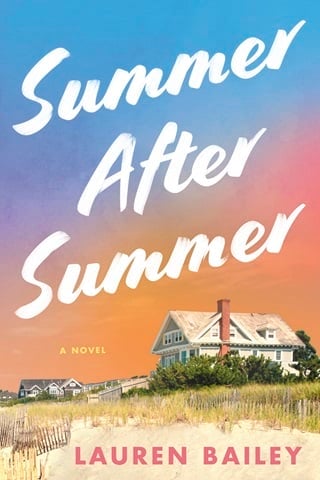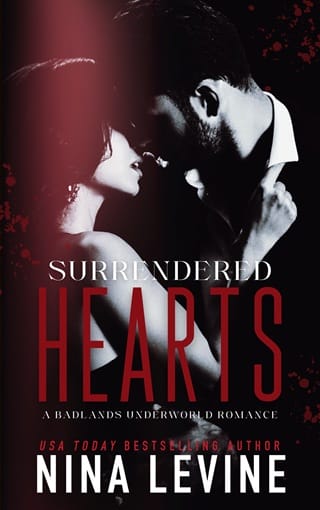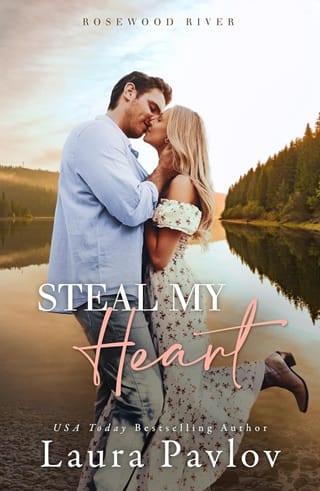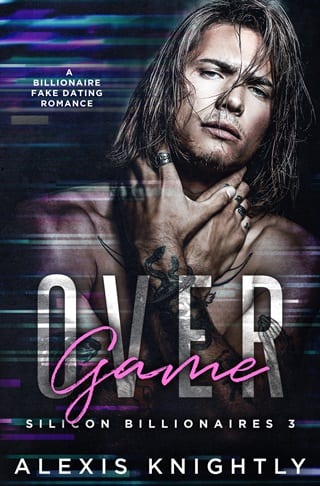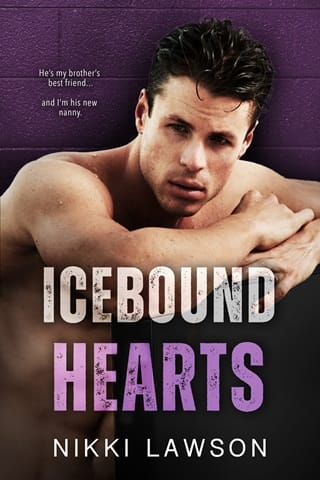Chapter 28
June 2013
My interactions with Fred in London take on the ping-pong quality of my tennis matches.
I face my opponents, trying not to look for him in the crowd, but I know he's there. Somehow, he stays out of sight. Maybe it's because the crowds are bigger each day than the last, a slow buzz building around me, bringing journalists and fans.
I've never really had fans before, not strangers who follow my stats other than the occasional man—always older, always oddly tanned like he's just come from the beach—who feels like I owe him my time because I'm a woman, and I exist in a world he's interested in.
But I've been pegged by the media as one to watch in this tournament, my half-year record and my jump in the standings marking me for special attention. After I win my second match against the other qualifier who's higher ranked than me, there are journalists to talk to, asking me questions about the potential streak I'm on, where it's going to end. I know better than to give in to that talk, so I spin the platitudes I've heard others share about seeing the ball well, and it not being my opponent's day and that I'm taking each match "one by one."
I try not to look over the journalist's shoulder for Fred, but I can sense him around. Somehow, I know that at some point, once I finish my cooldown and go back to my hotel, I'll receive a message from him.
This time, it comes in the cab.
Great match again. I'm impressed.
Our old texts have been pushed off the screen now. I have to scroll up to see them. I don't.
Thank you.
Everyone is talking about you.
Are they?
As they should be.
Don't you have to work?
When I told Mr. Van Keurig that I knew you, he told me to be the man on the ground.
Ah.
It's really great to watch you play again, Olivia.
Have you never … since …?
No—well, once in a while. Not in person.
I turn the screen over and rest it on my leg. If he watched any of my matches before now, then it was because he sought them out on ESPN 4 in the middle of the night. It's hard to think about that. The idea that Fred was up, maybe not being able to sleep, and he went in search of me. Was there someone sleeping peacefully in the bed next to him? Did he tell her about me?
"You all right, miss?" my cab driver asks in a thick accent that sounds like a song.
"I'm fine."
"I have tissues."
"Oh." I reach up. I'm crying. Not hard, but a few gentle tears. I wipe them away with the back of my hand. "No, thank you."
He gives me a reassuring smile over his shoulder. "Almost there."
He thinks I lost, my tennis bag and whites giving me away. And that's fine—it's fine. I did lose. I lost the life I thought I'd have to get this one, and it's not that bad. Certainly not worth crying over.
My phone buzzes against my knee.
How about that walk?Fred has written. It's a lovely day.
I'm sorry. I'm tired.
No worries at all. Best of luck for tomorrow.
Thank you.
I'll be watching.
Okay.
Olivia.
Fred.
We'll take that walk one day, yes?
The tears are about to start again, but I push them back. I'm stronger than this.
I can't make any promises right now. I have to focus on my matches.
I understand. I'll root for you either way.
Thank you.
And now I power my phone off and bury it in my bag. I don't want to be tempted to write him back, to change my mind, to change the course of my life again.
Instead, when the cab stops in front of my apartment, I tip the driver generously, let myself in, and breathe a sigh of relief that I can be alone for a few hours to take it all in.
I win another match, a hard-fought three-setter against another girl, only eighteen and local, that Britain had pinned its hopes on. The crowd is against me, but I try to ignore them as the push and pull of the match drags on. I win the first set, she wins the second, and then it's the final set, and I can feel that I've tired her out. Her energy is draining, and if I can maintain mine, I'll have done it. I dig deep and serve well, and when I win match point, I throw my arms in the air, releasing my racquet in a twirl, and it's this image—my amazed face, the racquet spinning above me—that's above the fold in the papers the next day and is played over and over on the nightly sports roundups.
I'm in the main draw! Because I beat their girl, the British press is on my side now, the crowd too. By luck, I've ended up on the easier side of the draw, filled with women I've beaten before, sometimes only a few weeks ago. I can see my path to the finals.
Seven matches to go.
Fred writes every day, always with the same offer of a walk, and I always decline. There's more time between my matches, though, now—a day off between each one—so he knows that when I decline to rest it's because I'm not ready to see him. He asks anyway, and each exchange lasts a little longer and reveals a little more of his past, what he's been doing these last five years. He asks me questions too, about my life. My sisters, my father, Ash.
We don't talk about romantic partners, and for me there's nothing to talk about. I've had boyfriends, short-term things with tour players or trainers because that's who you meet when you're on tour eleven months of the year, but nothing serious. I continue to resist googling him. If he's been squiring beautiful British heiresses or models around, I don't want to know.
It's a dance we're doing, a game of musical chairs.
When the music stops, who knows where we'll be sitting.
My first-round match at Wimbledon is against Slavenka, a Russian girl who's been on the circuit as long as me, but with more success. In the early years, we were rivals. But then she surpassed me and moved into the top one hundred while I stayed on the challenger circuit, and it's been years since I've played her. We play on one of the smaller courts, and her game is different from how I remember; she's developed a slice backhand that can go deep or turn into a drop shot without notice, and in the first set I'm running all over the court, getting to balls I wouldn't have even tried for last year.
When I win in two sets, I toss my racquet again, sensing that this is what the crowd wants as they stand and cheer. When it cracks as it lands, I pick it up and hand it to a kid on the sidelines, stopping to sign it first. This draws another cheer, and this time, for the first time, I do find Fred in the crowd. He's standing in a row of seats halfway up the grandstand, center court, dressed in a dapper linen suit, and he's clapping hard. I give a small curtsy—more cheers—do a quick interview, then walk off the court.
Six more to go,Fred writes half an hour later during my press conference.
No amount of media training truly prepares you for what they're like. My name is shouted over and over, and the same questions get asked in English, French, Spanish, and languages I barely recognize.
I give the same answers, but when my phone buzzes, I check it, and the smile on my face says something, because now they want to know who's texting me: Is the message from someone special in my life?
I blush and say no.
Ouch,comes Fred's text a moment later.
I flip my phone over and get back to the task at hand, and it's only later, when I'm slipping into a bath that will be followed by an hour of deep massage and stretching, that I realize he didn't ask me for a walk today.
My next match is a tough one against an American girl who grew up at one of those tennis academies in Florida that trained the Williams sisters and Capriati. Her name is Jenn—a beautiful blonde with modeling contracts and a grunt on each shot, which is distracting. I lose the first set, and I'm down a break in the second, but then Jenn runs for a ball that's just out of reach and twists her ankle. She's not injured enough to quit, but she's hobbling, not as quick to get to the ball, and I decide that it's now or never.
I up the power on my serves and get more aggressive at the net, and I take the set. On the changeover, the crowd is clapping for me, yelling, "Go, Olivia!," and I tap into their energy and make quick work of her in the third set.
Up goes the racquet again, and this time I really can't believe it.
I'm in the third round! The miracle talk is truly starting now, the way it does in sports, full of stats and probabilities, and how unlikely it will be if I make it. The press conference is full of it, and when it's over, I text Fred this time: Five to go! And he writes back a string of exclamation points, and I laugh.
Already, I'll make more money in this tournament than I made all of last year, but it's not about the money: it's about finally feeling like I'm living up to my potential, like the sacrifices I've made—no life, no love, no time off—are worth it.
Matt is fielding calls from sponsors, and I've been invited to three tournaments in the next couple of months that I would've had to qualify for, including the Rogers Cup in Montreal and—oh my God—the US Open.
I'm going to the US Open. Not as a guest, but as a competitor. I sit there shaking in the apartment, happy tears falling, and I almost text Fred again and suggest a walk, but no, I can't do that. I'm on a streak, and when you're on a streak, you have to respect it. I have to follow my exact same trajectory. Same boring meal, same stretching routine, same warmup, same hitting partner on the day off in between matches. I even watch the same movie at night to fall asleep.
It's like a magic spell. Any small deviation can break it.
And that's the last thing I want to do.
But then, in my next match, something's off. Part of it is the setting. They've put us on center court, and as I stood waiting to go out, I looked up at the extract from Rudyard Kipling's "If," and I felt the edge of panic. It says: "If you can meet with Triumph and Disaster / And treat those two impostors just the same." I don't know what it means, but the words triumph and disaster are not the same to me.
I take that uncertainty onto the court and everything feels off from the warmup. I haven't played this many matches in a row in a long time, and I'm tired. I'm playing against the ranking Canadian player, but she was born in England, and the crowd is more on her side than mine. It's hot out. The kind of sun that feels like it's burning your skin, no matter how much sunscreen you have on. I've never played well in the heat, and today is no exception. I drop the first set and try to fight back in the second. I hold my serve, and she holds hers, both of our grunts getting louder and now it's six–six.
Normally, we'd settle this in a tiebreaker, but not at Wimbledon. We'll keep playing until one of us wins this set. I play a sloppy game, and now she's up seven games to my six, and it's her turn to serve. It hasn't been the strong point of her game, this set, and I'm confident that I can get the break back. But she starts to serve well, and to win the points I thought I would. We're at thirty–thirty, and I nod to let her know I'm ready.
BOOM!
The hardest serve she's hit all day flashes past me. I don't even get my racquet on it. And now it's match point.
I'm going to lose,I think. Shut up, I tell myself.
I walk slowly to the other side baseline, trying to get that word, lose, out of my head. I turn to face her. She's sweating as much as I am, and she has all the pressure on her now to produce another serve like the last one, to win this match. The crowd is on its feet, and it's so loud in here, the noise is distracting. The chair umpire calls for silence and then up goes the ball and BOOM!
Another bomb that almost sails past me, but I get my racquet on it this time. It lands short and I run to cut off her angle as she reaches my drop shot. She hits it right to me, and I volley it back, dropping low, trying to put spin on it. I do, but it spins toward her, and I can see the shot she's going to make before she does—a forehand winner down the line. The ball passes me and there's nothing I can do.
I've lost. She drops to her knees, her hands covering her eyes in joy.
I put a brave face on, receiving a standing ovation from the crowd. I mime throwing my racquet up, and that draws a laugh. Then I sign it and give it to a young girl who looks like me. I collect my things and leave the court.
I step into the tunnel. The two men playing after me are there, waiting to come on court. One pats me on the shoulder and says something nice. I thank him, wish him luck, and he slips his headphones over his ears and goes back into his zone.
I shoulder my tennis bag, adjusting it. When I get past the men, there's another person in the tunnel, and I know, without my eyes adjusting fully to the indoor light, that it's Fred.
He smiles at me, shy, consoling and I finally do what I've been holding back since the cocktail party.
I rush into his waiting arms and let him gather me close, and I cry out my disappointment, but also my relief. That he's here. That it can be our time now.
That it's five years later once again, and somehow we've found each other.
 Fullepub
Fullepub 